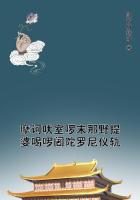"I will use plainer words," he replied--"so plain that you can not mistake them. I, your betrothed husband, the man you love and trust, ask you, Lillian Earle, who was it you met tonight in your father's grounds?"
He saw the question strike her as lightning sometimes strikes a fair tree. The color faded from her lips; a cloud came over the clear, dove-like eyes; she tried to answer, but the words died away in a faint murmur.
"Do you deny that you were there?" he asked. "Remember, I saw you, and I saw him. Do you deny it?"
"No," she replied.
"Who was it?" he cried; and his eyes flamed so angrily upon her that she was afraid. "Tell me who it was. I will follow him to the world's end. Tell me."
"I can not, Lionel," she whispered; "I can not. For pity's sake, keep my secret!"
"You need not be afraid," he said, haughtily. "I shall not betray you to Lord Earle. Let him find out for himself what you are, as I have done. I could curse myself for my own trust. Who is he?"
"I can not tell you," she stammered, and he saw her little white hands wrung together in agony. "Oh, Lionel, trust me--do not be angry with me."
"You can not expect me," he said, although he was softened by the sight of her sorrow, "to know of such an action and not to speak of it, Lillian. If you can explain it, do so. If the man was an old lover of yours, tell me so; in time I may forget the deceit, if you are frank with me now. If there be any circumstance that extenuates or explains what you did, tell it to me now."
"I can not," she said, and her fair face drooped sadly away from him.
"That I quite believe," he continued, bitterly. "You can not and will not. You know the alternative, I suppose?"
The gentle eyes were raised to his in mute, appealing sorrow, but she spoke not.
"Tell me now," he said, "whom it was you stole out of the house to meet--why you met him? Be frank with me; and, if it was but girlish nonsense, in time I may pardon you. If you refuse to tell me, I shall leave Earlescourt, and never look upon your false, fair face again."
She buried her face in her hands, and he heard a low moan of sorrow come from her white lips.
"Will you tell me, Lillian?" he asked again--and he never forgot the deadly anguish of the face turned toward him.
"I can not," she replied; her voice died away, and he thought she was falling from her chair.
"That is your final decision; you refuse to tell me what, as your accepted lover, I have a right to know?"
"Trust me, Lionel," she implored. "Try, for the love you bear me, to trust me!"
"I will never believe in any one again," he said. "Take back your promise, Lillian Earle; you have broken a true and honest heart, you have blighted a whole life. Heaven knows what I shall become, drifted from you. I care not. You have deceived me.
Take back your ring. I will say goodbye to you. I shall not care to look upon your false, fair face again."
"Oh, Lionel, wait!" she cried. "Give me time--do not leave me so!"
"Time will make little difference," he answered; "I shall not leave the Hall until tomorrow morning; you can write to me if you wish me to remain."
He laid the ring upon the table, refusing to notice the trembling, outstretched hand. He could not refrain from looking back at her as he quitted the room. He saw the gentle face, so full of deadly sorrow, with its white quivering lips; and yet he thought to himself, although she looked stricken with anguish, there was no guilt on the clear, fair brow.
He turned back from the door and went straight to Lord Earle.
"I shall leave Earlescourt tomorrow," he said, abruptly. "I must go, Lord Earle; do not press to stay."
"Come and go as you will, Lionel," said Ronald, surprised at the brusqueness of his manner; "we are always pleased to see you and sorry to lose you. You will return soon, perhaps?"
"I will write to you in a few days," he replied. "I must say goodbye to Lady Earle."
She was astounded. Beatrice and Lord Airlie came up to him there was a general expression of surprise and regret. He, unlike himself, was brusque, and almost haughty.
Sir Harry and Lady Laurence had gone home. Beatrice, with a vague fear that something had gone wrong, said she was tired;
Lord Airlie said goodnight; and in a few minutes Lady Helena and her son were left alone.
"What has come over Lionel?" asked Ronald. "Why, mother, how mistaken I am! Do you know that I quite believed he was falling in love with Lillian?"
"He did that long ago," replied Lady Helena, with a smile. "Say nothing about it. Lionel is very proud and impetuous. I fancy he and Lillian have had some little dispute. Matters of that kind are best left alone--interference always does harm. He will come back in a few days; and all be right again. Ronald, there is one question I have been wishing to ask you--do not be angry if I pain you, my son. Beatrice will be married soon--do you not intend her mother to be present at the wedding?"
Lord Earle rose from his chair, and began, as he always did in time of anxiety, to pace up and down the room.
"I had forgotten her claim," he said. "I can not tell what to do, mother. It would be a cruel, unmerited slight to pass her over, but I do not wish to see her. I have fought a hard battle with my feelings, but I can not bring myself to see her."
"Yet you loved her very much once," said Lady Helena.
"I did," he replied, gently. "Poor Dora."
"It is an awful thing to live at enmity with any one," said Lady Helena--"but with one's own wife! I can not understand it, Ronald."
"You mistake, mother," he said, eagerly; "I am not at enmity with Dora. She offended me--she hurt my honor--she pained me in a way I can never forget."
"You must forgive her some day," replied Lady Earle; "why not now?"
"No," he said, sadly. "I know myself--I know what I can do and what I can not do. I could take my wife in my arms, and kiss her face--I could not live with her. I shall forgive her, mother, when all that is human is dying away from me. I shall forgive her in the hour of death."















